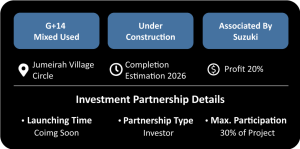There will soon be a dramatic shift to digital processes in the real estate industry. Non-fungible tokens, also referred to as NFTs have the potential to revolutionize the market by making transactions more efficient, expanding ownership to more people, and increasing market transparency. Some of the long-standing problems in real estate, like high entry barriers, slow transaction processes, as well as a lack of liquidity, may be solved by NFTs, according to their proponents. The use of NFTs, which utilize the potential of blockchain technology, can revolutionize the real estate investment process.
Role of Fractional Ownership:
Due to the high initial investment required to purchase any kind of property, this market has long been considered a playground for wealthy residents. As a result of this, a lot of people who might have invested before have decided not to, especially those with smaller budgets or who are just starting. By dividing a property into smaller, marketable pieces, NFTs pave the way for fractional ownership. So, investors can buy a smaller stake for a lot less money, rather than having to shell out millions to acquire a commercial building or a high-end vacation home. From the convenience of your own home, imagine yourself co-owning that seaside home with friends or coworkers or investing in an area of a skyscraper in a big city. Thus, more people are able to take part in the opportunities presented by real estate investment because of its democratization.
Transactions can be done conveniently now:
The process of selling a house has a history of being time-consuming and annoying. Finding a buyer can take months, alongside closing can be even more time-consuming due to the abundance of paperwork, inspections, reviews, and broker fees involved. These conventional roadblocks reduce market flexibility and may deter some investors. By linking ownership to a blockchain, a trustworthy digital ledger, NFTs simplify the process. Transactions are made more transparent, cheaper, and less time-consuming. Consider yourself selling your portion of a property on a safe internet platform, much like selling stocks on an exchange. New investors may feel more comfortable entering the real estate market if it becomes more accessible, and current investors may find it easier to maintain the assets they own.
Enjoy Transparency with NFTs:
The nightmare of which absence of documents and fraudulent mortgages is real for property owners. Forgery, human errors, and natural disasters are all potential problems with traditional paper-based systems. To produce a permanent record of ownership, NFTs use blockchain technology. The permanent and publicly accessible record of ownership is provided by the cryptographically recorded transactions on the blockchain. This makes sure that ownership records are correct and up-to-date on all occasions and removes the possibility of fraud via fake documents. The permanent nature and transparency of blockchain technology make digital ownership records far safer than those on paper. They are extremely difficult to hack or destroy since they are spread out throughout a network of computers. With this heightened protection, investors may rest effortlessly and disagreements over ownership are less likely to arise.
Understanding the Metaverse:
The real estate market is seeing a dramatic shift due to the development of virtual environments such as the Metaverse. A digital economy can be established within these virtual worlds through the use of NFTs, which can symbolize ownership of virtual land or structures. Think of all the ways you could make money if you owned a virtual piece of property that you could build on and sell. Create a virtual shop, run a casino, organize events, or simply rent out your property to others. Innovation has enormous potential, and the possibilities are limitless.
The online real estate market has all the supplies of a new, lucrative sector. There is a rising desire for virtual spaces for communication, gaming, and commerce, as well as businesses and brands are already seeking to build an audience in the Metaverse. Hence, with the potential for rental revenue, capital appreciation, and involvement in a flourishing digital economy, owning virtual real estate might be a profitable investment.








